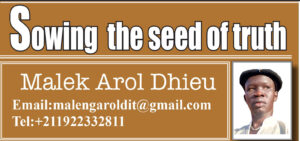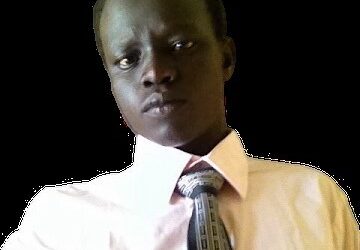The soil of South Sudan is highly fertile. It sounds like an insult when it is only called the land of South Sudan without adding the word ‘fertile’. It is agriculturally fertile; do you know that? If a few feddans of the land, which are cultivated, sustain people until the useless Ugandan flour arrives, then why can’t it be addressed properly as ‘fertile’?
Other countries have different rainfall descriptions, but South Sudan receives rainfall from mid-March to late November, a lengthy rainy season that could make any agriculture-dependent country produce as much as such a fertile season can yield.
It was not created for granted. God had a generational reason when He naturally fertilised and enriched South Sudan with abundant attractants for rain. South Sudan has an unexpiring contract with God to keep being fertile, although small parts being cultivated sometimes yield few crops, it is a normal phenomenon of life.
The soil was very happy 20 years back during the liberation struggle when South Sudanese knew no other sources of food other than cultivation. But when South Sudan became independent, the soil almost became mad over promises that agriculture is among the top 5 government priorities. While waiting for the fulfilment of promises, the soil frequently sees people, including those who know very well and have resources for cultivation, going to Uganda and coming back with lorries full of flour for consumption.
This is what distances agriculture far away from the priorities and in the minds of professionals. If I may ask you, why do you consume products that are labelled ‘for export only’? Who knows future harms they may contain? I’m upset. No state amongst the 10 states and 3 administrative areas of South Sudan that can deny fertility of the soil and abundance, including the flood-affected ones. So, why is a blessing not embraced and tasted?
If hunger has not taught people to use agriculture against it, then have the cries of desert-located countries not taught and awakened people to prioritise agriculture? Are people all aware that God withdraws His creations invisibly when seen unused? My dear South Sudanese, so many countries around the world often complain about inequalities during creation, but your country smiles at the complainers, meaning it is the very reason they complain about.
I can’t accuse the complainers that they might have bewitched farmers, agriculturalists and the government to heavily depend on imported products. But I accuse the profession of farmers and agriculturalists, and the obligation of the government to prioritize agriculture, for not attempting to rationalize agriculture.
President Salva Kiir tried agriculture and it yielded him a good harvest, but his inconsistency in agriculture has eroded the agricultural message in the minds of South Sudanese. Agriculture has also been attempted by the owners of the two opposite farms near Jebel Lado along Juba-Bahr El Ghazal highway, but I see products being swifted over South Sudanese and taken somewhere else, hence feeding South Sudanese only with smells and sights.
The soil can’t yield alone without crops being cultivated in it, therefore I am appealing to South Sudanese to reinvigorate their agricultural policies very well before the soil sends a withdrawing message to the creator, God, to think twice about what to do.
The soil is annoyed, honestly. It cannot stand another provocation from God for having requested Him during the creation to concentrate it on South Sudan alone because He earlier knew the North Sudan would concentrate the unnatural resources in the northern part.
Can you imagine having one country that its northern part is a desert and its southern part is foresty? What an unrealized favour! The soil’s major services are in cultivation, although it also contributes in nourishing trees to look greener, enhancing the view of the country, and to transpire healthily, helping in attracting rains. It is an agricultural season and I urge South Sudanese to prioritise agriculture as a means to eradicate hunger in South Sudan.
Thanks for reading “Sowing The Seed Of Truth”.




